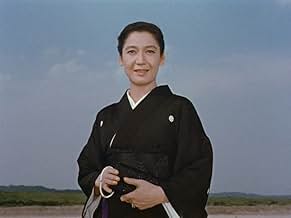Füge eine Handlung in deiner Sprache hinzuThe family of an older man who runs a small sake brewery become concerned with his finances and his health after they discover him visiting an old mistress from his youth.The family of an older man who runs a small sake brewery become concerned with his finances and his health after they discover him visiting an old mistress from his youth.The family of an older man who runs a small sake brewery become concerned with his finances and his health after they discover him visiting an old mistress from his youth.
- Regie
- Drehbuch
- Hauptbesetzung
- Auszeichnungen
- 1 Gewinn & 1 Nominierung insgesamt
Empfohlene Bewertungen
Ozu returns to familiar territory, including marrying off unwed relatives, familial obligations balanced against personal fulfillment, and the simple pleasures of domestic life. It all looks nice, each shot meticulously composed, and with added attention to ambient sound effects, like the sound of crickets chirping in the afternoon. Ozu only directed one film after this, 1962's An Autumn Afternoon, before dying in 1963 at age 60. His frequent star, and a major Japanese film fixture of the post-war years, Setsuko Hara, would also only appear in one more film, 1962's Chushingura. She lived in retirement another 53 years, passing away in 2015 at the age of 95.
Ozu's penultimate film, and perhaps this is reading too much into it, but its hard not to see his vision of his own impending death in it, despite the great humour in it.
This is a meditation on a dying world - despite the vibrant photography, the film resonates with images of passing - constant visions of graveyards, an old dying Japan, the families roots in a dying form of business as they are overtaken by big, highly capitalised larger companies. The ending is sad and inevitable, but not tragic - life does go on, and a new generation wills step in, even if the old traditions are not maintained.
One striking thing about this film is the incredible photography. Have humble domestic interiors every looked so stunningly beautiful? The lighting is luminous, every scene is as perfectly composed as a Vermeer painting.
Late Spring, Tokyo Story, Early Spring, and Tokyo Twilight
Wusstest du schon
- WissenswertesThe last of six collaborations between Yasujiro Ozu and Setsuko Hara.
- Zitate
Kitagawa Yanosuke: We humans can't come to terms with death until it's too late. Even people like my brother, who did as he pleased. On his deathbed, even Toyotomi Hideyoshi said: "It's as if my glorious life was but a dream within a dream."
- VerbindungenReferenced in Ikite wa mita keredo - Ozu Yasujirô den (1983)
- SoundtracksIn a Persian Market
Composed by Albert Ketèlbey
Top-Auswahl
- How long is The End of Summer?Powered by Alexa
Details
Zu dieser Seite beitragen



































